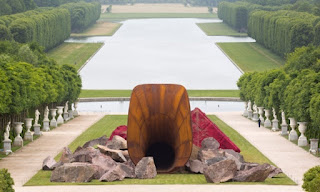Monday, June 22, 2015
Anish Kapoor, the Rococo, and Political Pornography
I have not been to Versailles to see Anish Kapoor's piece "Dirty Corner," but I have been following the controversy over it, and I don't really understand why it is controversial.
This article by Jonathan Jones explains two of the main reasons I find this piece delightful:
http://www.theguardian.com/artanddesign/jonathanjonesblog/2015/jun/04/anish-kapoor-versailles-vagina-not-shocking
As a giant seashell surrounded by rocks, "Dirty Corner" offers a literal representation of the rococo, raised to the grand scale of Versailles. The likely origin of the term "rococo" is "rocaille," which describes a design style that was invested in seashells and rocks. Rococo art and design flourished under Louis XV. Reacting to the straight lines of classicism, rococo art values the curves that are found in nature (see Hogarth's "Analysis of Beauty"). But the playful designs of porcelain (especially at Sevres) push color far out of natural palettes. If you tour the Grand Trianon, there's a whole set of eighteenth-century furniture that is very close to the shade of pink on the triangular rocks in the background.
Jones also mentions political pornography that surrounded Marie Antoinette. Chantal Thomas has analyzed this phenomenon quite thoroughly in her book The Wicked Queen, which includes some translated examples. Marie Antoinette was variously accused of being a lesbian and a nymphomaniac in these pamphlets, many of which took the form of plays. (There's one called Le Godmiche Royal, which means "The Royal Dildo." It's a dialogue between Marie Antoinette and her sex toy.)
The yonic imagery was not what I found most compelling about "Dirty Corner," but the vandalism seems intent on fixing the meaning of the piece as a vagina and not a seashell. In all the photographs I've seen of the vandalism, the color, spray, and location of the paint suggests semen. Are the vandals trying to push the perceived obscenity of the piece further, so that others will share their view that this is beyond the realm of good taste? To re-assert a masculine authority over feminine imagery by making it more "dirty"?
Subscribe to:
Comments (Atom)

